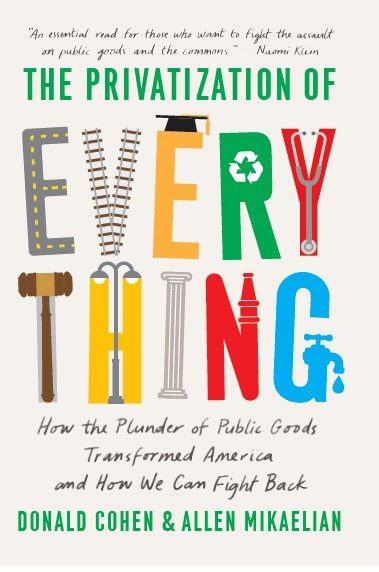March 28, 2023
Paperback “Privatization of Everything” Now Available
This newsletter, and the associated book, is an interesting read through the lens of school choice and efforts from its proponents to turn education into a system that looks more like health care or prisons in the United States (as opposed to looking more like education systems in other nations).
The weekly newsletter for people who want the government to work for all of us, not just the wealthy few. Not a subscriber? Sign up here.
Your support makes our work possible. Please donate, we’d deeply appreciate it.
Privatization of Everything: Now in Paperback
The paperback edition of my 2021 book, The Privatization of Everything, is now available online at Bookshop (and other outlets) and in some bookstores. Its reappearance allows me to reflect on why we wrote the book in the first place.
If you peruse the index, you might wonder what an elementary school in Washington, D.C. has to do with the Food and Drug Administration, how our National Parks relate to parking meters in Chicago, why the history of Philadelphia’s water supply is connected to fare-free transit in Kansas City, or what Jonas Salk has to do with Sallie Mae.
What they have in common is the concept of the public: public schools, public spaces, public safety, public health, public investment for a common good.
The book is an argument intended to reclaim the idea of the public and reclaim our governments as tools of the public. It is a call to use public conversation and debate to define public goods, and to ensure those public goods remain under public—democratic—control.
Apparently, that word, public, upsets some people.
There’s a reason the name of former Secretary of Education Betsy DeVos turns up when discussing seemingly disparate efforts to obstruct the delivery of both covid-related healthcare services in Michigan and quality public education across the country. Turns out, they’re not so disparate. You’ll also find the cash of the Koch Brothers and the fingerprints of the right-wing American Legislative Exchange Council (ALEC) on legislation all over the country on issues as diverse as school privatization and environmental regulations.
The forces aligned against the public interest embrace a doctrine derived from the myth that government has no business doing anything the private sector can do and anyway “does better”—cheaper, faster, more efficiently. They do not see the potential of government as an expression of democratic will, but rather as an obstruction to the marketplace. They believe privatization—of schools, water systems, prisons, and so on—is the solution to our problems.
What is privatization? Here’s how we define it in the book:
“Privatization is the transfer of control over public goods to private hands. Sometimes this happens during procurement—the outsourcing of public services to a private contractor. In other cases, it’s due to austerity—reducing public funding of a vital public good and letting private options take over. Or it can happen through deregulation—when we eliminate or fail to enforce public control through important regulatory safeguards for consumers, workers, or the environment. In all these ways, privatization is a transfer of power over our own destiny, as individuals and as a nation, to unelected, unaccountable, and inscrutable corporations and their executives.”
As we argue in the book, privatization is primarily a political strategy—one designed to separate us from public goods, our government, and each other.
And privatization is pervasive. It reaches into all corners of our lives—from the very water we drink, to the food we eat. It’s so ubiquitous, we don’t even realize it.
After I made a presentation to an organization about the book, one staff member told me she began to think differently about privatization. “I was really struck by how the invisibility and prevalence of privatization ends up undermining support for public goods.”
That’s why I hope this book will become a useful tool—a desk reference, a call to arms, a playbook, an argument to organize around, and—in the stories of those who have confronted privatization whenever it threatens a public good—an inspiration.
With the paperback version, I hope that we can make the book more affordable and the ideas more accessible to a wider audience. We hope the book can help instigate or center discussions about how to counter efforts at privatization, and how to restore faith in the possibility of government as a force for good.
In our newsletter next week, we will outline several concrete ways the book can be used—by activists, labor unions, students, teachers, elected officials, candidates—and ways we can facilitate that with presentations, bulk discounts, and more.
Donald Cohen
Executive Director
In the Public Interest
1305 Franklin St., Suite 501
Oakland, CA 94612
United States
No comments yet.
RSS feed for comments on this post. TrackBack URI
- SEO Powered Content & PR Distribution. Get Amplified Today.
- Platoblockchain. Web3 Metaverse Intelligence. Knowledge Amplified. Access Here.
- Source: https://virtualschooling.wordpress.com/2023/03/28/paperback-privatization-of-everything-now-available/





